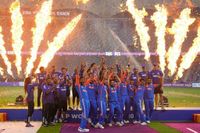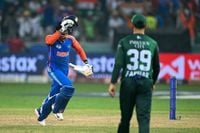The Asia Cup 2025 final, played under the dazzling lights of Dubai International Cricket Stadium on September 28, will be remembered for far more than just the cricketing action. India’s five-wicket victory over arch-rivals Pakistan, a result that should have sparked jubilant celebrations, instead gave way to an unprecedented off-field controversy that has gripped the cricketing world and reignited political tensions between the two nuclear-armed neighbors.
On the field, the contest was a classic. Set a modest target of 147, India’s chase began on shaky ground. Early wickets tumbled as Abhishek Sharma, Suryakumar Yadav, and Shubman Gill all departed cheaply, thanks to incisive bowling from Faheem Ashraf and Shaheen Shah Afridi. But the crisis brought out the best in young Tilak Varma. Anchoring the innings with a calm and composed unbeaten 69 off 51 balls, Varma’s knock was a masterclass in handling pressure, studded with three fours and four towering sixes. He found allies in Sanju Samson, who chipped in with 24, and Shivam Dube, whose brisk 33 turned the tide back in India’s favor after the early collapse.
As the required run rate crept into double digits, Varma’s nerves never wavered. A straight drive brought up his fifty, and a thunderous six off Haris Rauf in the 18th over put India within touching distance of the target. The final flourish came from Rinku Singh, who, facing his first delivery, lofted a boundary over mid-on to seal the chase. India had secured their record-extending ninth Asia Cup crown—or so it seemed.
Earlier, Pakistan had looked set for a big total after a rapid 84-run opening partnership between Sahibzada Farhan (57) and Fakhar Zaman (46). But once Varun Chakaravarthy broke that stand, the innings unraveled. Kuldeep Yadav’s 4-30 and Jasprit Bumrah’s late strikes restricted Pakistan to just 146, a score that ultimately proved insufficient. The collapse was as dramatic as the events that would follow.
But the cricketing drama paled in comparison to what unfolded at the presentation ceremony. As per tradition, the winning team should have been handed the trophy by the Asian Cricket Council (ACC) president—in this case, Mohsin Naqvi, who also serves as the Pakistan Cricket Board chairman and Pakistan’s interior minister. However, the Indian team refused to accept the trophy from Naqvi, citing objections to his political role and recent frosty exchanges between the two sides.
The result? A 45-minute standoff on the podium. Indian players stood at a distance, making it clear to organizers that they would not participate if Naqvi presented the silverware. The crowd, sensing the tension, erupted in chants of “Bharat Mata Ki Jai,” their boos echoing through the stadium. Naqvi, left standing awkwardly on stage, eventually exited with the trophy, which was then whisked away to the dressing room. For the first time in memory, the Asia Cup was not awarded to its rightful winners on the field.
Former India coach Ravi Shastri, speaking on Sony Sports, did not mince words: “The game was worthy of a final and then you hang around for 45 minutes still not knowing what’s happening. I mean, it’s ridiculous.” His frustration was echoed by fans and pundits alike, who decried the politicization of what should have been a moment of pure sporting joy.
Indian Prime Minister Narendra Modi, never one to shy away from linking sport and politics, congratulated the team on social media, drawing a pointed analogy to recent military clashes. “Operation Sindoor on the games field. Outcome is the same – India wins! Congrats to our cricketers,” Modi posted on X, referencing the country’s recent armed confrontation with Pakistan. Home Minister Amit Shah also weighed in, praising the team’s “fierce energy” and hinting at the broader narrative of national pride.
The response from across the border was swift. Mohsin Naqvi fired back at Modi’s war analogy, stating on X: “If war was your measure of pride, history already records your humiliating defeats at Pakistan’s hands. No cricket match can rewrite that truth. Dragging war into sport only exposes desperation and disgraces the very spirit of the game.”
The trophy standoff was merely the latest flashpoint in a tournament fraught with political undertones. Even before the first ball was bowled, calls for boycotts and a lack of cordial gestures—such as the traditional pre-toss photoshoot and post-match handshakes—set a chilly tone. The Indian team, led by Suryakumar Yadav, faced criticism at home for even minimal interactions with Pakistani counterparts. According to Devajit Saikia, BCCI chairman, “We have decided not to take the Asia Cup trophy from the ACC chairman, who happens to be one of the main [political] leaders of Pakistan.”
Inside the dressing rooms, the tension was palpable. Pakistan’s players remained out of sight for nearly an hour after the match, while Indian players celebrated their victory on the podium—without the trophy. Captain Suryakumar Yadav was even seen playfully miming a trophy for the cameras, a visual summary of the surreal moment.
Analysts and historians of South Asian cricket were quick to point out the stark contrast with previous eras, when the sport served as a rare bridge across the diplomatic divide. In the past, cricket matches between India and Pakistan, though fiercely contested, were also opportunities for gestures of goodwill and people-to-people contact. But as Irfan Nooruddin of Georgetown University observed, “The aborted trophy ceremony was the culmination of growing jingoism.” He lamented that the legacy of the final might be remembered for the lack of sportsmanship rather than the cricket on display.
Ali Khan, author of Cricket in Pakistan: Nation, Identity, and Politics, noted that earlier generations of players enjoyed more frequent contact and camaraderie, which is now missing. “The environment is so hostile in India that no one would risk opposing what is essentially a government directive to maintain a very hostile stance towards Pakistan,” he said.
Despite the controversy, the cricket itself was a showcase of talent and grit. Kuldeep Yadav’s four-wicket haul and Tilak Varma’s match-winning knock will be talked about for years. Yet, the Asia Cup 2025 final will likely be remembered as much for what happened after the last ball was bowled as for the action on the field.
As the dust settles in Dubai, the trophy remains locked away, a symbol of a rivalry that has outgrown the boundaries of sport. With no bilateral series on the horizon and diplomatic ties at a historic low, the Asia Cup final stands as a stark reminder: sometimes, the biggest battles are fought not on the pitch, but in the moments that follow.



